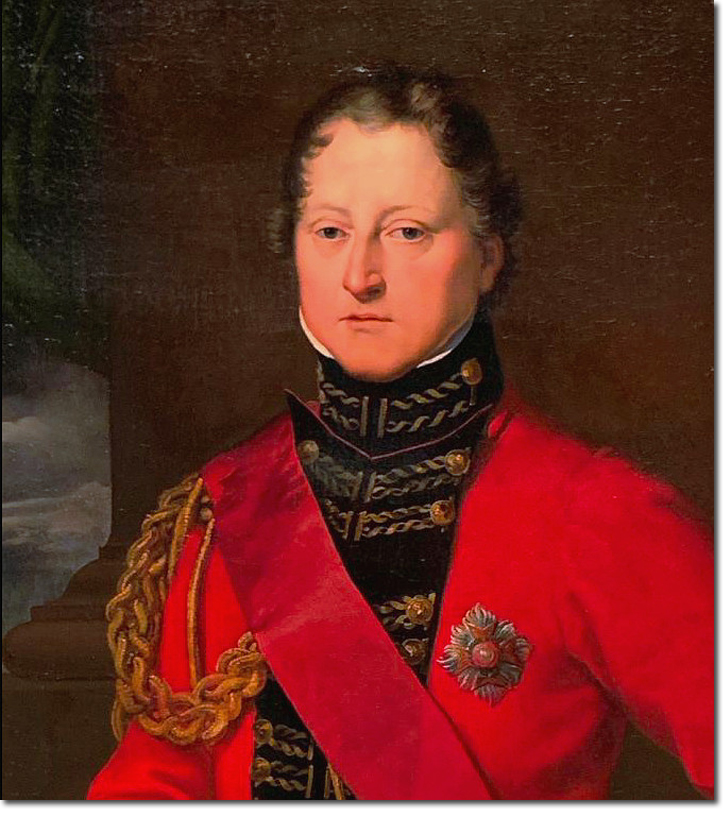|
|


|
|
Gordon Drummond was born in Quebec city on 27 Sep 1772. His father was Colin Drummond of Megginch Castle, Perthshire and his mother was Catherine Oliphant of Rossie. Colin Drummond came to Canada in 1764 as the Quebec agent for a London firm that supplied the British army with food and other necessaries. He became Commissary General and Deputy Paymaster General to the forces, but died in 1776 when Gordon was 4. The family left Canada four years later so that Gordon was educated at Westminster School. He entered the British Army as an ensign in the 1st Royal Regiment of Foot in 1789.
By 1794 Gordon was a lieutenant-colonel serving in the Duke of York’s expedition to the Netherlands. He successfully repelled a French sortie at the siege of Nijmegan. He was also in Abercrombie’s invasion of Egypt in 1801, leading the 8th King’s Regiment ashore at Aboukir. He was at the Battles of Alexandria and Cairo. There was further campaigning in the Mediterranean and the West Indies so that by 1805, at the age of 33, he was a major-general. Drummond’s greatest achievement was his leadership in Canada during the War against America in 1812-15. He returned to Canada in 1813 as lieutenant-governor of Upper Canada. His first success was the capture of Fort Niagara. He then fought the Battle of Black Rock and burned Buffalo in retaliation for the American burning of Newark. Drummond was persuaded by Attorney-General Robinson to put forward legislation to prosecute traitors, as Canadians had been complicit in the destruction of Newark. Eight men were hanged in July 1814 as a result. Later in July, Drummond took his force to Fort George, and reinforced Major-General Riall at Chippawa. This developed into the Battle of Lundy’s Lane. Each side suffered heavy casualties and Riall was captured. Drummond himself was badly wounded in the neck. He pursued the enemy to Fort Erie where the Americans fought a brilliant defence that brought a series of unfortunate setbacks to Drummond who was overseeing every aspect of the siege. He was forced to give up and withdraw to Chippawa. But the Americans did not celebrate their victory for too long because shortage of supplies forced them to abandon Fort Erie in November, and the next year, the British were reinforced by troops from Europe which enabled them to launch an offensive, effectively ending hostilities in early 1815. Drummond was promoted to Governor-General and Administrator of Canada in Quebec City. He was welcomed in the House of Assembly as a son of Canada and a war hero. As a civil administrator he was involved in military settlements and Indigenous affairs. One of Drummond’s allies in the War was John Norton who had a Scottish mother but a Cherokee father. He was a deserter from the British army who was adopted by the Mohawks and worked as interpreter and teacher, eventually becoming a Mohawk chief called Teyoninhokarawen. Drummond described him as a man ‘of the coolest and most undaunted courage’ and fought hard to secure a pension for him. Drummond was a popular general and worked hard to help the men under his command. He secured the battle honours of NIAGARA, LUNDY’S LANE and FORT ERIE for the units involved. And all his prize money was used to support widows and orphans. He sailed to England in 1816 to be rewarded by a grateful Prince Regent who conferred the GCB (Knight Commander of the Grand Cross of the Order of the Bath), the first Canadian to receive this honour. He was promoted to General and eventually became the most senior General in the army. He was also appointed Colonel of the following:
88th Regiment (Connaught Rangers) 3 Nov 1819 In 1807 Drummond married Margaret Russell, daughter of a rich banker and coal merchant, William Russell of Brancepeth Castle. They had two sons and a daughter; Gordon, who was an officer in the Coldstream Guards in the Crimean War but died in 1856. William Russell Drummond RN who died in Peru in 1835, and Eliza (1811-1894) who married Henry Howard, 2nd Earl of Effingham and had 7 children. General Sir Gordon Drummond GCB died at his home in London on 10 October 1854 at the age of 82. Several places in Canada are named after him. |
Upper Canada | Upper Canada Administrators
Armed Forces | Art and Culture | Articles | Biographies | Colonies | Discussion | Glossary | Home | Library | Links | Map Room | Sources and Media | Science and Technology | Search | Student Zone | Timelines | TV & Film | Wargames